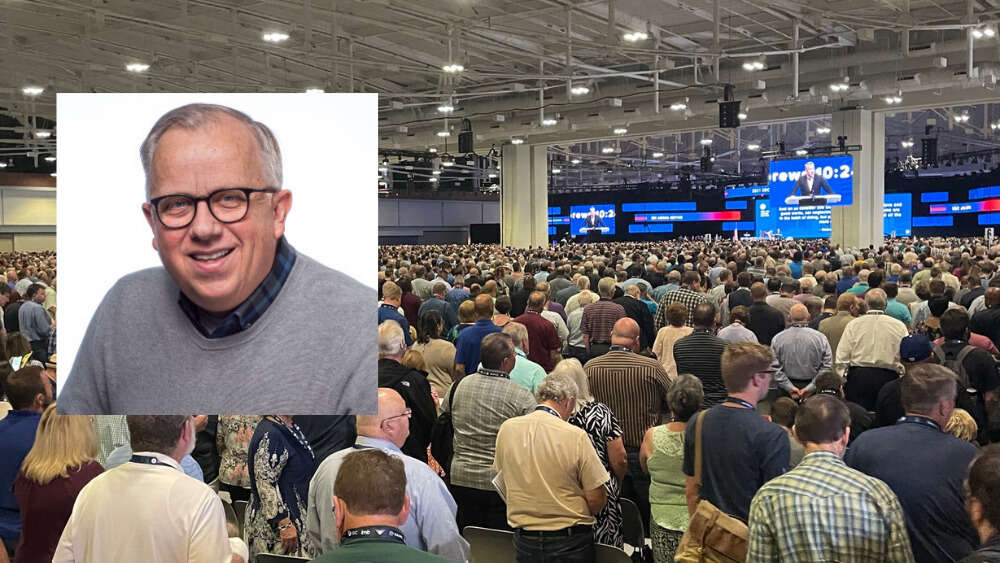The Southern Baptist Convention (SBC) has elected Ed Litton as their new president, choosing a leader with experience working towards racial reconciliation, and holding off a push from a group on the right opposed to Critical Race Theory (CRT).
Alabaman pastor Litton received 52 per cent of the vote (6,834 votes) defeating Mike Stone from Georgia (6,278 votes) in the runoff election on Tuesday in Nashville. More than 15,000 church representatives were in attendance – one of the SBC’s largest meetings in decades.
Litton was regarded by many as the only candidate who could hold the denomination together, with reports of a “mass exodus” by some groups if other candidates were elected.
During the nomination process Fred Luter – the only Black pastor to have served as SBC president – described Litton (who is white) as the “uniter” that Southern Baptists need.
“At a time when conservative Southern Baptist African American leaders are questioning their connection to the convention, Ed has uniquely shown his commitment to racial reconciliation.” – Fred Luter
“Ed is uniquely qualified to do that,” said Luter.
“At a time when conservative Southern Baptist African American leaders are questioning their connection to the convention, Ed has uniquely shown his commitment to racial reconciliation.”
Luter also praised how Litton had dealt with the problem of sexual abuse within the SBC – another key issue in the denomination at present. Recently, letters written by Russell Moore, outgoing president of the Ethics and Religious Liberty Commission (the policy arm of the Southern Baptist Convention), were leaked. The letters appeared to show some SBC leaders have stymied efforts to hold churches accountable for sexual abuse allegations, dismissed accounts of abuse and undermined advocates.
But it was the issue of race – and the academic framework of Critical Race Theory, in particular – that dominated the convention, resulting in an election of such slim margins.
“If some people in this room were as passionate about the gospel as they are about critical race theory, we would win this world to Christ.” – James Merritt
“If some people in this room were as passionate about the gospel as they are about critical race theory, we would win this world to Christ,” said James Merritt, chairman of the resolutions committee and a former convention president.
Litton’s opposition, Pastor Mike Stone, was backed by a new group called the Conservative Baptist Network. Stone supported a motion to explicitly repudiate CRT, saying it contradicts the Baptist faith and message.
Stone campaigned hard for the presidency, speaking in churches across the country and even appearing on Fox & Friends. And, in the first ballot, Stone received 36 per cent of the votes in the first ballot, followed by Litton at 32 per cent, eliminating two other candidates including longtime Southern Baptist Theological Seminary president Albert Mohler.
In contrast, Litton – a relatively unknown senior pastor of Redemption Church in Saraland, Alabama – is known for doing work towards racial reconciliation from the 2014 riots after the killing of Michael Brown in Ferguson, Missouri, until the present.
“At times it seems like an incredibly dysfunctional family. But we love each other.” – Ed Litton
On Monday morning, outgoing president J.D. Greear invited members of the executive committee, which acts on behalf of the convention when it is not in session, to join him in prayer for unity of the denomination.
On Tuesday, Grear told the convention that CRT arises from “a worldview at odds with the gospel,” and also condemned ‘Pharisees’ in the movement who prioritised ideological purity over its evangelistic mission. And, in the end, Greear promoted heeding the voices of “leaders of color who tell us that our denunciations of justice movements fall on deaf ears when we remain silent on the suffering of our neighbors.”
SBC delegates evidentally agreed, voting against the anti-CRT proposal promoted by Stone.
Instead, an alternative was agreed to which does not mention CRT by name but does reject any view that sees racism as rooted in “anything other than sin.” In addition, the SBC’s 1995 resolution – which apologised for the denomination’s history of racism – was also affirmed. (The SBC was founded in 1845 in support of slavery and for “condoning and/or perpetuating individual and systemic racism in our lifetime”.)
At the news of Litton’s election, Dwight McKissic – a Black, Texan pastor who had vowed to leave the SBC if Stone won – tweeted: “Repeatedly being asked, am I going to remain in the SBC. Integrity demands that I do so. Resolution 9 was/is untouched & Ed Litton, a man who has a good track record & right heart on race, was elected president. Therefore, I will remain. SBC is in good hands with Litton.”
Litton – who is no doubt aware he was elected, at least in part, because he would not divide the denomination – was likewise tempered in his speech following the announcement of the election result.
“We’re a family, and at times it seems like an incredibly dysfunctional family,” Litton said. “But we love each other.”
Email This Story
Why not send this to a friend?



